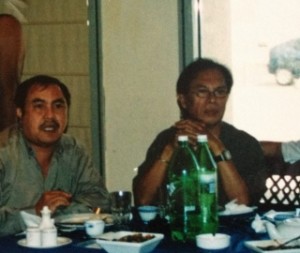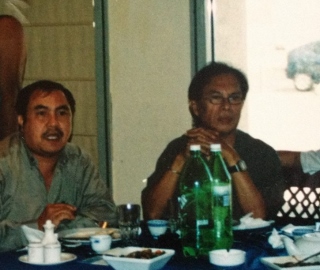
By J. Dela Torre MY MEMORY of Behn is that of a classless person, forgive the expression. I meant he wasn’t conscious of one’s social background. He saw us all as students of the performing arts, just as he considered himself to be, regardless of which probinsiya we came from, or what our socio-economic status was.
The three of us from Aklan–Art Salido, Mel Sauza and myself—wet behind the ears and uninitiated to the nuances of big-city life, were treated just like everybody else was–people who had the slightest inkling of what the theatre was and who could be trained into selflessly coming out onto that stage and performing before a packed theatre without a trace of timidity and self-doubt.
UP Repertory, the drama group to which I used to belong and which Behn founded, actually wasn’t just a training ground for budding artists –it was our boot camp for our future lives. Behn transformed us in his own unique way from being individuals with some pretty rough edges in our character and personality and honed us into disciplined, community-oriented, hard-nosed warriors, ready to face and hopefully slay the evil dragons of this world.
I haven’t pursued a career in the performing arts but I kept tab of what was going on with UP Repertory in general and Behn in particular. I wanted to do more than read his newspaper columns and hear tidbits about what was going on with the lives of fellow Repists.
When I was appointed as Labour Attache, I thought that I was now in a better position to elevate my involvement into something more concrete, and, well, socially relevant. I invited Behn to teach theatre basics to Filipino domestic helpers in Hong Kong where I was first assigned. Behn considered theatre as a uniting force, which could rally the Filipino community in Hong Kong in a common task, rather than get engaged in traditional community activities which he considered divisive, such as beauty contests and sports competitions.
In 2004, I again invited him to direct the Philippine Embassy’s show to commemorate Philippine Independence Day in Israel. The original idea was to just showcase the evolution of Philippine fashion through our history. But he dismissed the idea as bordering on the traditional, and why not expand it to dramatize the struggle for freedom of the Filipino people through drama, songs, dance and of course fashion? Since we couldn’t afford to bring a planeload of performing artists from the Philippines to Tel Aviv, and anyway, Behn wouldn’t have approved the idea, we saw the 25,000-strong Filipino community of caregivers in Israel as a rich source of talent.
And so, soon after he landed in the Holy Land with his assistant Mark, we set about the task of finalizing the show concept, identifying the performing and production people who will be involved and raising the funds to finance what to me was a gargantuan task.
It wasn’t indeed a walk in the park. Behn hated pretentiousness and mediocrity and he chewed anyone who appeared to be not doing his or her best, and he wasn’t too keen about arguing with people who had impractical ideas. He could live with ideas which differed from his own, or indeed even those opposing his, but you needed to prove that your idea would work. I remember during our Repertory days, we would tour the provinces during summer breaks to bring our performances to the people. One time, we performed in the town plaza of one of the remote towns of Cebu, and since this was a rural area, everybody expected it would be a walk-over but Behn never let up on his demand for us to do our best. It didn’t matter, he said, whether we were performing for the Queen of England or to the poor farmers of Cebu—you owe it to your audience to do your best. In Israel, he wasn’t tyrannical or whimsical by any measure.
He could be tetchy and fly into a temper at times but I understood because we were pressed for time, and he didn’t want to put out a show to the Israeli public without being assured that no stone had been left unturned to give our audience the best. He would compromise on the quality of the physical aspects of the production–the costumes, the props and the sets–such as when we had to settle for crooked bamboo poles from China for our tinikling and singkil, but never on the quality of the performance.
It was inevitable therefore that a few individuals who didn’t come up to par had to be axed. One who had an Arab background thought he could just wing it through the whole process and showed a slovenly attitude towards self-discipline and always coming in late for rehearsals. He was unceremoniously dismissed from the show. A few years later, he became a TV actor in Manila.
The more serious issues however were that the caregivers only had the weekends to rehearse because they had to work on weekdays. We solved the problem by rehearsing by scenes and in the evenings. My apartment in Jaffa became a makeshift theatre for this purpose.
On days when I couldn’t get people together for a rehearsal, I would bring him to the iconic places where Christ is believed to have spent time. I couldn’t divine what went on in his mind during these visits to Jerusalem, Nazareth, Tagba, and Capernaum, but he looked very thoughtful.
On Friday evenings, he would join us on “the rooftop”, the hangout of most Filipino caregivers from the Visayas and Mindanao—literally the rooftop of the house fronting the wet market of Carmel where a Filipina caregiver almost lost her life after a bomb planted by terrorists blew up just inches from her.
And then, we were constantly on the lookout for immigration authorities because we had quite a few among the crew and the performers whose visas had long expired.
But this was something we couldn’t effectively address, except by me and my staff constantly driving these TNTs to and from rehearsals in our diplomatic cars, which shielded them from arrest. But we couldn’t sustain the shuttle service as long as we needed to, and it came to a head during our second performance in Jerusalem when one of our actors was accosted by the police and brought to detention. It wasn’t a total loss because each role had an understudy, but the poor guy wasn’t too happy ending his career in Israel the way he did.
Two weeks before the first show, Behn thought that the show lacked a crowd-drawing star, so we agreed that we had to get somebody whose name was easily recognizable but who hopefully wouldn’t ruin our budget.
We had Pinky Marquez, and after hearing her perform, I concluded I would’ve sold my arm and my leg to get her over to Israel anyway, without question. She was just magnificent, especially when she interpreted “Light of a Million Mornings” which Behn said she also sang during EDSA II at a particularly dull morning when the crowd needed electrifying.
We did two shows in Tel Aviv and two in Jerusalem. In the latter, we had to clench our teeth in anger when we couldn’t enter the theatre before Sabbath ended. We’re not Jewish, we protested. True, they replied in that sardonic tone, but we hold the keys.
The Jewish administrators wouldn’t budge from their orthodoxy, and so the whole troupe milled around the entrance impatiently waiting for sunset to come. We improvised by doing our makeup outside the theatre in nippy weather, and thus saved time.
We did one matinee and one in the evening. After the evening show in Tel Aviv, the wife of the US Ambassador remarked to Behn, “It must have cost you a fortune to bring all these artists from the Philippines!”
Behn rose up to his full height, flashed his famously icy glare and coolly answered, “No, Madame, those artists you saw on stage are your Filipino caregivers!” Madame couldn’t believe her ears, nor could we. We had transformed our caregivers in Israel not only into performing artists, but as the Philippines’ best ambassadors of goodwill in Israel. We made sure to capture some of the best reviews, and we heard some quite flattering remarks from Israelis that they weren’t aware that the Philippines had such a rich cultural heritage and a courageous history.
Some of us were probably just vaguely aware too of how as a nation we had such a colourful history and culture expressed through the arts but only re-discovered this when we got involved in the production of “Saplotsaysay”. To me and to the Filipino caregivers of Israel, their families and the Israelis who were privileged to have seen the show directed by one of the best in our generation–this was Behn’s legacy.
When I returned to the Philippines after a six-year stint abroad, I was assigned first to Baguio, where I asked Behn to give English communications lessons to prospective call-center agents of a huge call-center company based there.
Between classes, he would go to the ukay-ukay shops which abound in Baguio. He was a keen ukay-ukay hunter, able to detect at a glance the colors and the style which suited him best. The simple pleasure which Behn derived from combing the streets of Baguio and anywhere he happened to be for bargain clothing was to me a marked contrast from the high-flying types and the nouveau-riche of Philippine society who wouldn’t be seen dead within a hundred meters of an ukay-ukay, for whom Behn had little patience.
Behn revelled in flaunting conventions and throwing a finger at the pretentious. The rich and the mighty were no exceptions: if he happened to be in a mall playing American rock music, or in a Philippine Airlines plane playing the latest Western pop, he would make sure to call for whoever was in charge and give him a piece of his mind for not playing Filipino music.
For him, it was such a waste of Filipino talent that even our national flag carrier and our big department stores do not make it a policy to play Filipino music. Playing Filipino music is the best way to introduce our rich cultural heritage to foreigners, and yet our own radio stations only allot a short percentage of airtime to Original Pilipino Music.
I was then transferred to Davao, after a short stint in Manila, and there I had the pleasure of accompanying Behn trying to trace his family roots in Davao Oriental and Davao del Sur. He met with known relatives, and with some who appeared to be related to him. It was like Behn was trying to re-discover his identity and renew his ties with his ancestors.
He got very excited talking about and recollecting persons and events in his life and that of his family’s. It occurred to me that he was already having forebodings of his own mortality. Even in casual conversations I had with him, he would speak about going out without a fuss, and more importantly, he didn’t want to be a burden to his family and friends. His greatest fear was to be confined to a wheelchair and be pushed about like an invalid. To the end, he wanted to go with his dignity and self-respect intact.
To me and hopefully to all of us in UP Repertory, and to those whose lives have been touched and transformed by Behn, we know where his identity lies. He belongs to our hearts and to our collective memories and we will always remember him as one who taught us how to assert and fight for our rights and for what belongs to us; that being mediocre in anything we did was a disservice to one’s self and to humanity; to never be afraid of tilting with the windmills in a quixotic cause because if we joined our hands in one mighty thrust of the lance, the windmills in our society might just fall; that though we will pass on eventually like him, we would leave this world a better place if we did what is right.
It has been more than thirty years since we left the portals of UP Diliman to pursue our own individual careers, but it’s amazing how our memories of Behn still seem fresh in our minds. It must be because he has left a deep imprint in our lives and in the lives of others we have influenced through what we have learned from Behn Cervantes.
For me and my family, his passing is a great personal loss. We weren’t related at all, but over the years, Behn has become such an integral part of our lives that he has become almost family to us, and we to him. In Cebu where I have my home, he made sure to sleep over, not because he had no place to stay, as Rovi, his niece, had a nice house there, but he just wanted to get to know my family better. Even in those close personal encounters, he didn’t fail to tell us off, perhaps not in so many words, but by the slightest furrowing of his eyebrows and a change in his tone, what I should have done to pursue my career, etc. etc. I would resent it at first, but over the years, I have realized he was right. He was my big brother and my old man.
Years from now, the government might be minded to award him the National Artist Award which he so richly deserves even while he was living, but to me the greatest influence he had on me and my family, was that he was our moral compass, who taught me that there are things in this world that are far more important than wealth and power, and that if I wanted to be part of the solution rather than the problem, I best be putting my shoulders to the wheel and do what is right. J. dela Torre is currently the Philippine Labor Attache based at Philippine Embassy in Canberra, ACT.










Leave a Reply